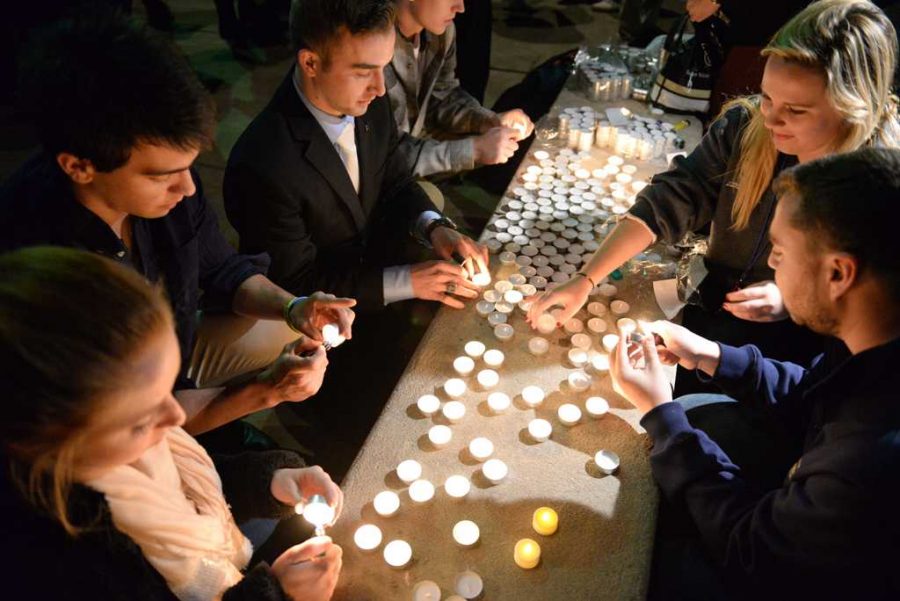Though they gathered under an American flag, a tearful crowd of Pitt community members spent two minutes in silence for a grieving international community Monday night.
About 200 people, including Pitt students, faculty members and anti-war activists, gathered in front of the American flag outside of the Cathedral of Learning for a candlelight vigil in honor of the 129 lives lost to terrorist attacks on Friday, Nov. 13, in Paris. The attacks, for which the Islamic State, or ISIS, have since claimed responsibility, also included a double suicide bombing in Beirut and multiple bombings in Baghdad this weekend. Four Pitt students are studying abroad in France this semester, three of which were in Paris at the time of the attacks. Pitt has confirmed the safety of all four students, though none could be reached in time for publication.
Honorary Consul Jean Dominique Marie Le Garrec from the French Consulate in Pittsburgh opened the vigil as members of the audience passed hundreds of flickering candles to one another. In his speech, Garrec stressed that it is the responsibility of this generation to find “a solution to this clash of ideas [and] values.”
“When you lose loved ones or [when you lose] compatriots, the pain that you feel is just as grave,” Garrec said.
The consul received letters and flowers from the people of Pittsburgh and the embassy in Washington, D.C, which he said embodied a strong sense of national and local support.
Garrec said France and the United States have long been allies, but he is touched now to see college students continue the friendship between the two countries on a personal level.
The affects of the weekend’s attacks reached students studying in France from universities all over the United States.
Millersville University juniors, Jordan Johnson and Kyle Boulanger who are studying at the American Business School in Paris, were at the France vs. Germany soccer game at the Stade de France on Nov. 13, when a series of explosions went off outside the stadium.
Three suicide bombers attempted to enter the stadium with explosives strapped to their chests between 9 and 9:30 p.m. Friday night. When none of them could get past security, they detonated the explosives, which Johnson and Boulanger heard from their seats safely inside the stadium.
“Approximately 20 minutes into the game, we heard the first explosion and could feel it in our seats,” Johnson said in an email. “At first we were unsure if it was a part of the sound effects, so we continued to watch the game like normal. Then we heard another explosion. When the second explosion went off we were worried this was more than just sound effects, but there was no worry from the crowd so we continued to watch the game.”
Authorities at the Stade de France did not evacuate the stadium immediately, in order to secure the exterior. It was only when alerts and social media updates began flooding the students’ phones after halftime, that they realized what was happening. They walked an hour back to their apartments instead of taking the metro, in fear of more attacks.

“Currently, we are feeling shocked and sad by the events that occurred on Nov. 13. We do not understand how people can have so much hate in them to commit these acts of violence,” Johnson, who will be returning to the United States in December, said. “From now on we will make sure to be extra vigilant as we go about our everyday lives in Paris.”
Kathryn Banaszynski, a senior studying French and political science attended the vigil. She has studied abroad in Paris and has friends and colleagues who are studying there now, but felt connected to the American citizens reacting to the violence from home.
“I just felt close to everyone around me,” Banaszynski said after the vigil. She was particularly touched by Garrec’s comment that many of the victims of the attacks were young, so support from college students is important.
Helen Ann Lawless, a senior sociology major, said the shooting at the Parisian music hall, The Bataclan, is a scene she can’t shake.
“There is no language for music,” Lawless said, tears brimming her eyes. “That is something that connects people all over the world. To exploit something like that for something so evil really rocked me.”
Lawless banded together with Matthew Sykes, the vice president and chief of finance of SGB, and Alexander Cupo, a senior environmental studies major, to organize Monday’s vigil.
“We wanted to show that Pitt students … can show their solidarity for the global community and peace,” Cupo said.
That solidarity is exactly what some students felt.
Sykes said no particular organization held the vigil, but that the student body had united as a whole.
“We came together in solidarity. It’s kind of a joint effort among a lot of students,” Sykes said.
Following the attacks, Humza Hnesh, vice president of the Muslim Student Association, said he finds comfort in the solidarity among Pitt students.
“The symbolic, representative solidarity that the vigil brings is the most important thing,” Hnesh said. “Islam is a religion of peace, that’s told over and over again.”
Alaa Mohamed, a senior sociology and global studies major, teared up as Pitch Please, a Pitt a cappella group, performed “Lay Me Down” by Sam Smith at the vigil.
“It’s just such an ironic paradox that such evil could bring people together at the same time,” Mohamed said, still wiping away tears long after she blew out her candle.
Following the attacks, U.S. governors, including Greg Abbott of Texas and presidential candidate John Kasich, called on President Obama to disallow Syrian refugees from entering their states.
In September, Mayor Bill Peduto was one of 18 mayors nationwide that called on the U.S. government to send more Syrian refugees to their cities. Mohamed said she was proud of Peduto’s promise to continue facilitating Syrian refugee resettlement to Pittsburgh.
“We’re not going to let these things bring us down as human beings,” Mohamed said, bringing attention to those who are victims of terrorist violence every day in Syria and Iraq. “This is their everyday reality. The biggest victims are also the ones being seen as the biggest perpetrators now.”


